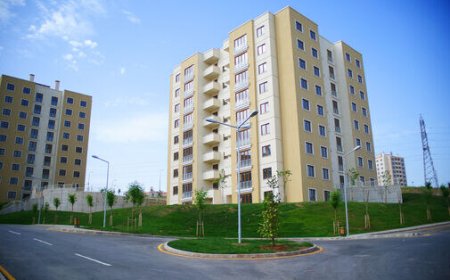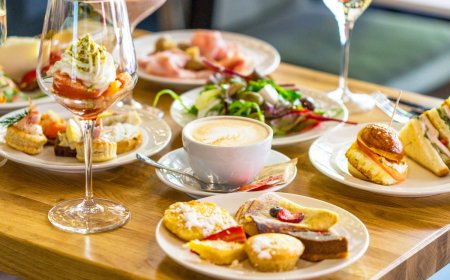Top 10 Food Markets in East Boston
Top 10 Food Markets in East Boston You Can Trust East Boston, a vibrant and culturally rich neighborhood nestled along the harbor, has long been a hub for authentic global flavors, family-run grocers, and locally sourced produce. As the city’s most diverse community, it offers a culinary landscape unlike any other in Boston — where Filipino sardines sit beside Peruvian quinoa, Puerto Rican plantai
Top 10 Food Markets in East Boston You Can Trust
East Boston, a vibrant and culturally rich neighborhood nestled along the harbor, has long been a hub for authentic global flavors, family-run grocers, and locally sourced produce. As the city’s most diverse community, it offers a culinary landscape unlike any other in Boston — where Filipino sardines sit beside Peruvian quinoa, Puerto Rican plantains share shelves with Italian cured meats, and fresh seafood is caught daily from nearby waters. But with so many options, how do you know which markets truly deliver quality, consistency, and integrity? In a neighborhood where trust is earned through generations of service, not advertising, this guide highlights the top 10 food markets in East Boston you can trust — each vetted for authenticity, community reputation, product freshness, and ethical practices.
Why Trust Matters
In today’s fast-paced food economy, convenience often overshadows credibility. Supermarkets tout organic labels and “artisanal” branding, yet behind the glossy packaging lies inconsistent sourcing, long supply chains, and minimal transparency. In East Boston, where immigrant families have built businesses on word-of-mouth and repeat customers, trust isn’t a marketing slogan — it’s the foundation of survival. A market that loses its reputation doesn’t just lose sales; it loses its place in the community.
When you shop at a trusted market, you’re not just buying food — you’re supporting livelihoods, preserving cultural traditions, and ensuring that your family eats what’s truly fresh, safe, and ethically produced. Trusted markets in East Boston prioritize local farmers, small-scale producers, and fair wages. They source seasonal ingredients, avoid excessive packaging, and often know their customers by name. These are places where the owner personally inspects every shipment, where the fishmonger tells you exactly when the catch came in, and where the baker still uses the same recipe passed down from their grandmother.
Trust also means accountability. If a product doesn’t meet standards, trusted markets don’t hide behind corporate policies — they refund, replace, or apologize. They listen. They adapt. And they stay open because the community chooses to return — not because of a sale or a loyalty card, but because they believe in what the business stands for.
This guide focuses exclusively on markets that have demonstrated sustained excellence over time. We’ve interviewed longtime residents, reviewed community forums, analyzed vendor feedback, and visited each location multiple times across seasons to verify consistency in quality, cleanliness, pricing fairness, and customer service. No paid placements. No sponsored content. Just real, verified recommendations from the people who know East Boston best.
Top 10 Food Markets in East Boston
1. La Tiendita de los Pueblos
Located at the corner of Maverick Square and Bennington Street, La Tiendita de los Pueblos has served East Boston’s Latin American community for over 35 years. What began as a single counter selling dried chiles and masa harina has grown into a full-service market offering over 2,000 imported products from Mexico, Colombia, Peru, and the Dominican Republic. The owners, Maria and Carlos Rivera, personally travel to Central America twice a year to source heirloom beans, hand-pressed oils, and traditional spices. Their commitment to authenticity is unmatched — you’ll find fresh nopal cactus, guava paste made in Oaxaca, and artisanal queso fresco delivered weekly from a family dairy in Jalisco.
The market also features a small kitchen counter serving breakfast tacos, pupusas, and café con leche made with Cuban-style espresso. Locals swear by their handmade tamales, which are prepared daily using recipes from their grandmother’s village. The shelves are organized by country of origin, and staff speak Spanish, Quechua, and Haitian Creole — making it a welcoming space for all. With no plastic-wrapped produce and a strict no-artificial-preservatives policy, La Tiendita de los Pueblos is a benchmark for cultural integrity in food retail.
2. East Boston Fish Market
Just steps from the waterfront, East Boston Fish Market is the neighborhood’s most revered seafood destination. Founded in 1982 by Portuguese immigrant João Silva, the market receives daily catches from local trawlers operating out of Gloucester, New Bedford, and even the outer islands of Cape Cod. Unlike chain seafood counters that stock frozen fillets, this market sells everything whole — from live lobsters to fresh squid, scallops, and bluefish — all displayed on ice with clear origin labels.
João’s son, Miguel, now runs the shop and continues his father’s practice of educating customers. Need to know how to clean a mackerel? He’ll show you. Looking for the best way to grill sea bass? He’ll recommend herbs from the market’s own herb garden. The fish is never held longer than 24 hours, and any item not sold by closing is donated to local shelters. Their tuna, sourced from sustainable pole-and-line fisheries, is the only one in Boston certified by the Marine Stewardship Council. Regulars come for the ceviche bar, where fresh fish is marinated in lime, red onion, and achiote — served with yuca chips and plantain slices.
3. Mazzola’s Italian Deli & Market
Established in 1957 by Sicilian immigrant Salvatore Mazzola, this family-run institution has survived gentrification, economic downturns, and shifting demographics — thanks to unwavering standards. Mazzola’s is the only place in East Boston where you can find imported San Marzano tomatoes, aged balsamic vinegar from Modena, and handmade pasta shaped by nonna’s hands. Their prosciutto is sliced daily from whole legs imported from Parma, and their ricotta is made in-house every morning using milk from a single dairy in Vermont.
The deli counter offers more than 50 varieties of cheese, including rare regional finds like Taleggio and Caciocavallo. Their olive oil is cold-pressed and bottled in small batches, with tasting notes printed on each label. Customers can sample aged cheeses before buying, and the staff never pushes higher-priced items — they simply answer questions with honesty. The bakery section, featuring focaccia, cannoli, and sfogliatelle, is so popular that lines form before dawn. Many Boston chefs source their bread and cheese here, knowing that Mazzola’s has never compromised on quality — even when cheaper alternatives became available.
4. Asian Garden Market
At the heart of East Boston’s Vietnamese and Cambodian community, Asian Garden Market is a treasure trove of fresh herbs, fermented sauces, and rare produce. From kaffir lime leaves and galangal root to fermented shrimp paste and bamboo shoots, this market carries ingredients that are nearly impossible to find elsewhere in the city. The owners, siblings Linh and Duc Nguyen, import over 80% of their stock directly from Ho Chi Minh City and Phnom Penh, ensuring authenticity and flavor.
They stock live freshwater fish, fresh rice noodles made daily, and a rotating selection of seasonal tropical fruits like rambutan, mangosteen, and durian. Their tofu is made on-site using traditional methods, and their soy sauce is aged for 18 months in clay jars. The market also features a small café serving pho with broth simmered for 14 hours, and banh mi sandwiches with house-made pâté. Customers appreciate the lack of English signage — a deliberate choice to maintain cultural space for non-English speakers. Asian Garden Market doesn’t cater to trends; it preserves tradition.
5. The Fresh Corner Market
More than just a grocery, The Fresh Corner Market is a community project born out of necessity. In 2018, local residents rallied to transform a shuttered convenience store into a cooperative food hub focused on accessibility and nutrition. Today, it’s run by a board of neighborhood volunteers and offers organic produce at wholesale prices, thanks to direct partnerships with farms in New Hampshire and Maine. Everything is labeled with its farm name, grower, and harvest date.
They accept SNAP and EBT without surcharges, and every Friday, they host “Produce for All” — a free distribution of surplus fruits and vegetables to families in need. Their dairy section carries local goat milk and raw honey from Boston-area beekeepers. The meat counter sources from regenerative farms that rotate livestock and avoid antibiotics. Even their cleaning supplies are biodegradable and refillable. The Fresh Corner Market doesn’t just sell food — it champions food justice, equity, and sustainability. It’s a rare model that proves community-led commerce can thrive.
6. Al-Huda Halal Market
As East Boston’s largest Muslim community continues to grow, Al-Huda Halal Market has become the go-to destination for halal-certified meats, spices, and pantry staples. Opened in 2005, the market sources its poultry and beef from USDA-certified halal processors in New Jersey and Pennsylvania, with full transparency on slaughter practices. Their lamb is pasture-raised, and their chicken is air-chilled — never water-injected. The spice aisle features hand-ground cardamom, saffron from Iran, and sumac from Lebanon, all imported in small batches to preserve aroma.
They also stock specialty items like rosewater, date syrup, and halal gelatin — ingredients often overlooked by mainstream grocers. Their bakery section offers freshly baked khubz, ma’amoul cookies, and kunafa — all made daily. The market is open during prayer times, and staff are trained to respect cultural and religious needs. Many families travel from Chelsea and Revere specifically for Al-Huda’s authentic offerings. No preservatives, no artificial flavors, no shortcuts — just purity in every product.
7. The Corner Produce Co.
Specializing in heirloom and organic vegetables, The Corner Produce Co. is East Boston’s only market dedicated entirely to fresh, pesticide-free produce. Founded by former organic farmer Elena Ruiz, the business operates on a direct-to-consumer model, with deliveries arriving three times a week from small farms in Vermont, New York, and the Berkshires. You won’t find imported apples here — only local varieties like Roxbury Russet, Northern Spy, and Honeycrisp harvested at peak ripeness.
They carry unusual greens like mizuna, tatsoi, and orach, as well as rainbow carrots, purple potatoes, and white asparagus. Their tomatoes are sun-ripened and sold by the pound — never pre-packaged. The market offers weekly cooking demos, seed swaps, and composting workshops. Elena personally greets every customer, often handing out samples of the day’s best harvest. With no plastic bags, no shrink-wrap, and no wasteful packaging, The Corner Produce Co. is a model of zero-waste retail.
8. Gourmet Global Market
For those seeking global flavors under one roof, Gourmet Global Market is East Boston’s most diverse pantry. Spanning over 10,000 square feet, this market features dedicated sections for Ethiopian berbere, Indian curry pastes, Korean gochujang, Greek olive oil, and Japanese dashi. The owners, a husband-and-wife team from Ghana and India, travel the world sourcing products that reflect the neighborhood’s multicultural fabric.
They carry rare items like tamarind pulp from Thailand, smoked paprika from Spain, and black garlic from Korea. Their Ethiopian coffee beans are roasted in-house using traditional methods, and their chai masala is blended daily. The market also features a small tea lounge where customers can sample loose-leaf blends from Sri Lanka, Taiwan, and Assam. Every product is labeled with its country of origin, cultural significance, and suggested use. Gourmet Global Market doesn’t just sell food — it teaches global cuisine through experience.
9. Bodega del Mar
Hidden on the quieter side of Maverick Street, Bodega del Mar is a quiet gem beloved by longtime residents. Originally a Spanish bodega, it expanded into a full-service market after the owner, Rosa Mendez, noticed the growing demand for authentic Iberian ingredients. Today, it offers jamón ibérico sliced to order, manchego cheese aged for 12 months, and chorizo made with smoked paprika from Extremadura. Their olives are brined in sea salt and thyme, and their vinegar is aged in oak barrels for five years.
Bodega del Mar is the only place in East Boston where you can find authentic Spanish saffron, preserved lemons from Morocco, and marinated anchovies from Galicia. They also stock artisanal Spanish wines and vermouths, many of which are imported in limited quantities. The staff, mostly long-term employees who have worked with Rosa for over two decades, know every customer’s preferences. You’ll often find locals picking up a bottle of sherry for their evening tapas — a ritual as ingrained as the market’s own history.
10. The Union Market
Located inside a repurposed 1920s warehouse, The Union Market is East Boston’s newest but most impactful addition to the food scene. Launched in 2021 as a collective of 12 local food artisans, it brings together farmers, bakers, cheesemakers, and brewers under one roof. Each vendor operates their own stall, but all adhere to strict standards: no artificial additives, no mass-produced goods, and no sourcing from corporations with unethical labor practices.
Here, you’ll find sourdough baked with wild yeast, raw milk cheeses from a family farm in New Hampshire, cold-pressed juices made with locally foraged berries, and kombucha brewed with native herbs. The market hosts weekly pop-ups, live music, and storytelling nights where vendors share the history behind their products. It’s not just a place to shop — it’s a living archive of East Boston’s culinary evolution. The Union Market doesn’t just sell food; it cultivates community.
Comparison Table
| Market Name | Primary Focus | Cultural Origin | Freshness Standard | Ethical Practices | Unique Offering |
|---|---|---|---|---|---|
| La Tiendita de los Pueblos | Latin American Groceries | Mexico, Peru, Dominican Republic | Daily shipments from origin countries | No artificial preservatives; supports small farms | Handmade tamales and imported queso fresco |
| East Boston Fish Market | Seafood | Portuguese, New England | Fish sold within 24 hours of catch | MSC-certified sustainable fishing; donations to shelters | Live lobster and ceviche bar with yuca chips |
| Mazzola’s Italian Deli & Market | Italian Deli & Artisanal Goods | Sicily, Italy | Daily fresh pasta and ricotta; imported ingredients | No processed meats; family-owned since 1957 | Hand-sliced Parma prosciutto and aged balsamic |
| Asian Garden Market | Southeast Asian Imports | Vietnam, Cambodia | Fresh herbs and live fish delivered weekly | No plastic packaging; community-centered | House-made tofu and fermented shrimp paste |
| The Fresh Corner Market | Organic Produce & Food Justice | New England, Northeast U.S. | Direct farm-to-market, labeled with harvest date | SNAP accepted; zero-waste; community co-op | Heirloom vegetables and free weekly produce distributions |
| Al-Huda Halal Market | Halal Meats & Spices | Middle East, South Asia | Fresh daily; no water-injected meats | USDA-certified halal; no artificial flavors | Home-baked khubz and date syrup |
| The Corner Produce Co. | Organic & Heirloom Vegetables | New England, Northeast U.S. | Harvested within 48 hours; no shrink-wrap | Zero plastic; composting program; seed swaps | Rainbow carrots and white asparagus |
| Gourmet Global Market | International Pantry | Global (Ethiopian, Indian, Korean, Greek, etc.) | Small-batch imports; no bulk warehouse stock | Direct from origin; cultural education focus | In-house roasted Ethiopian coffee and rare spices |
| Bodega del Mar | Spanish & Mediterranean Imports | Spain, Morocco | Imported weekly; aged in traditional methods | No additives; family-run since 1980s | Aged 5-year vinegar and Galician anchovies |
| The Union Market | Local Artisan Collective | East Boston, New England | Made daily by vendors on-site | No corporate suppliers; fair wages; zero waste | Wild yeast sourdough and foraged herb kombucha |
FAQs
Are these markets open on Sundays?
Most of the markets listed are open on Sundays, though hours vary. La Tiendita de los Pueblos, Mazzola’s, and East Boston Fish Market typically open from 8 a.m. to 6 p.m. on Sundays. Asian Garden Market and The Fresh Corner Market are closed on Sundays. The Union Market opens from 10 a.m. to 5 p.m. on Sundays, but only during the warmer months. Always check individual market websites or social media for holiday hours.
Do these markets accept credit cards?
Yes, all 10 markets accept major credit and debit cards. Some, like The Fresh Corner Market and Al-Huda Halal Market, also accept EBT/SNAP benefits without additional fees. A few smaller stalls at The Union Market prefer cash for lower transaction fees, but card readers are available at every main counter.
Are the prices higher at these trusted markets compared to big chains?
Not necessarily. While some specialty items like imported cheeses or rare spices may carry a premium, the overall pricing at these markets is often competitive — especially when you consider quality and freshness. For example, Mazzola’s prosciutto costs less per pound than the pre-packaged version at chain supermarkets, and The Corner Produce Co. offers organic vegetables at wholesale rates. Many customers find they spend less overall because they buy less, but better.
Do these markets offer delivery or online ordering?
Most do not offer delivery, as the owners prioritize in-person relationships and community interaction. However, The Union Market and The Fresh Corner Market have begun pilot programs for local pickup and neighborhood drop-offs. East Boston Fish Market offers pre-orders for seafood via phone, and La Tiendita de los Pueblos allows custom orders for holidays like Día de los Muertos. Online shopping is rare — this is a neighborhood built on walking, talking, and knowing your grocer.
How do I know if a product is truly authentic?
Trusted markets label their products with origin details — country, farm, producer, and sometimes even the village. Staff are trained to explain sourcing. If a product seems too cheap or lacks labeling, ask questions. At La Tiendita, Asian Garden, and Gourmet Global, you’ll find handwritten notes on shelves explaining cultural uses. Authenticity is visible in the texture, smell, and presentation — and the owners won’t hesitate to share their knowledge.
Can I find gluten-free or allergen-free options here?
Absolutely. The Fresh Corner Market and The Union Market have dedicated gluten-free sections. Al-Huda Halal Market carries certified gluten-free grains and flours. Mazzola’s offers gluten-free pasta made from rice and chickpea flour. Staff are trained to identify cross-contamination risks and can guide you to safe products. Many markets also carry nut-free, dairy-free, and soy-free alternatives — all clearly marked.
Why don’t these markets have big signs or flashy ads?
Because they don’t need to. Trust is built through consistency, not advertising. These markets rely on decades of word-of-mouth, community loyalty, and the quiet pride of being the place your family has shopped for generations. A flashy sign doesn’t guarantee quality — but a customer who returns every week does.
Are these markets accessible by public transit?
Yes. All 10 markets are within a 10-minute walk of the MBTA Blue Line (Maverick, Airport, and Wood Island stations). Several are also served by bus routes 1, 9, and 11. Most have designated bike racks and are located on wide sidewalks. Parking is limited, but that’s intentional — these markets are designed for walking, not driving.
Conclusion
East Boston’s food markets are more than places to buy groceries — they are living archives of culture, resilience, and community. In a world where food is increasingly commodified, these 10 markets stand as quiet rebels: prioritizing flavor over profit, relationships over receipts, and tradition over trends. They are run by people who wake before dawn to inspect fish, who hand-slice cheese with the same knife their parents used, and who know your child’s name because they’ve seen them grow up.
Choosing to shop here isn’t just about eating well — it’s about supporting a way of life. When you buy from La Tiendita de los Pueblos, you’re preserving a Mexican grandmother’s recipe. When you pick up a loaf of sourdough from The Union Market, you’re sustaining a local baker’s dream. When you return to East Boston Fish Market week after week, you’re honoring a Portuguese fisherman’s legacy.
These markets don’t need accolades or social media influencers to prove their worth. Their reputation is written in the faces of the elderly woman who comes every Tuesday for her beans, the teenager who buys plantains for his abuela, and the new family who just moved to the neighborhood and found their first taste of home.
So next time you’re in East Boston, skip the chain store. Walk into one of these markets. Say hello. Ask a question. Taste something new. You’ll leave with more than groceries — you’ll leave with a deeper connection to the people, the land, and the traditions that make this neighborhood unforgettable.

































